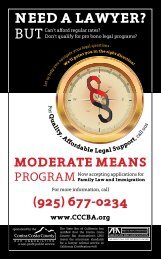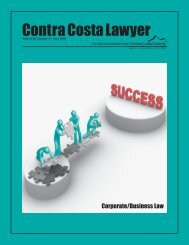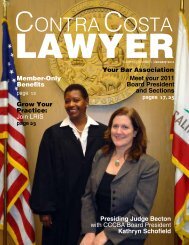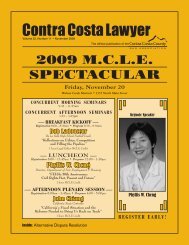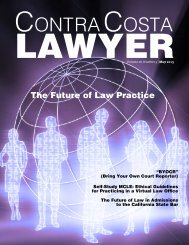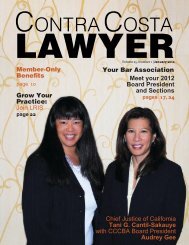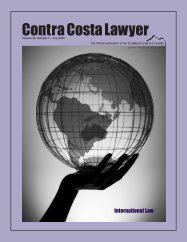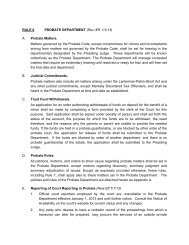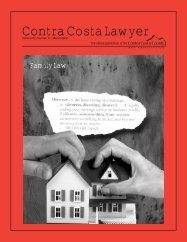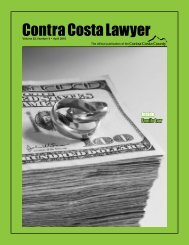download - Contra Costa County Bar Association
download - Contra Costa County Bar Association
download - Contra Costa County Bar Association
Create successful ePaper yourself
Turn your PDF publications into a flip-book with our unique Google optimized e-Paper software.
IRS Return Preparer Regs Derailed<br />
by Warren Peterson<br />
On January 18, 2013, the<br />
United States District<br />
Court for the District of Columbia<br />
decided Loving v.<br />
Internal Revenue Service, 1 derailed<br />
the IRS’ efforts to regulate hundreds<br />
of thousands of tax return preparers<br />
who are not attorneys, CPAs or<br />
enrolled agents with the IRS (hereinafter<br />
“unenrolled preparer”). The<br />
IRS had promulgated regulations<br />
that required unenrolled preparers<br />
to register with the IRS, pass a<br />
qualifying exam, pay an annual<br />
application fee and take 15 hours of<br />
continuing education each year.<br />
Three unenrolled preparers<br />
brought suit to enjoin the regulations.<br />
In an opinion issued just in<br />
time to throw things into a turmoil<br />
for this tax season, the District Court<br />
granted summary judgment to the<br />
plaintiffs finding that the IRS did<br />
not have the statutory authority to<br />
regulate unenrolled preparers.<br />
The IRS’ effort to regulate unenrolled<br />
preparers was prompted by<br />
Youngman & Ericsson, LLP<br />
1981 North Broadway • Suite 300<br />
Walnut Creek, CA 94596<br />
Tax Lawyers.<br />
www.youngman.com (925) 930-6000<br />
the increasing importance of third<br />
parties and tax preparation software<br />
in the preparation of tax returns.<br />
In 2007 and 2008, over 80 percent<br />
of federal individual income tax<br />
returns were prepared by paid tax<br />
preparers or by taxpayers using tax<br />
preparation software. The IRS has<br />
estimated that there may be 1.2 million<br />
paid preparers. 2<br />
Organizations such as the IRS National<br />
Taxpayer Advocate 3 and the<br />
Treasury Inspector General for Tax<br />
Administration (TIGTA) 4 have each<br />
identified errors and omissions in<br />
the preparation of tax returns by<br />
both unenrolled preparers and national<br />
tax preparation chains. Many<br />
critics argued that the wide-open<br />
nature of the industry makes it difficult<br />
to ensure minimum competence<br />
and ethical standards for unenrolled<br />
preparers. 5<br />
The IRS has been focusing on<br />
this issue since June 2009, when the<br />
Commissioner of the IRS, Douglas<br />
Shulman, initiated the Return Preparer<br />
Review. The IRS solicited input<br />
from the public which led to the<br />
following recommendations:<br />
1. Mandatory tax return preparer<br />
registration.<br />
2. Mandatory competency examinations<br />
for unenrolled preparers.<br />
3. Required continuing professional<br />
education for unenrolled<br />
preparers.<br />
4. Extension to unenrolled preparers<br />
of the ethical standards established<br />
by Treasury Department<br />
Circular 230. 6<br />
The IRS implemented these recommendations<br />
by adopting regulations.<br />
The system was to go into full<br />
effect as of the beginning of 2013.<br />
The IRS reported that 88 percent<br />
of those expressing an opinion favored<br />
registration of unenrolled<br />
preparers. Those who addressed<br />
the issues of minimum education<br />
and testing requirements were 90<br />
percent in favor of such requirements.<br />
7 At the same time, others did<br />
not favor the direction the IRS was<br />
taking on regulation of unenrolled<br />
preparers. There were objections to<br />
the costs and burden the regulatory<br />
regime would place on return preparers,<br />
with the costs likely being<br />
passed onto taxpayers. 8<br />
This opposition to the new regulatory<br />
requirements prompted the<br />
filing of Loving. The District Court<br />
determined that the key question<br />
was whether tax return preparers<br />
are ‘representatives’ who ‘practice’<br />
before the IRS” (Loving, p. 9). The<br />
court considered the meaning of<br />
CONTRA COSTA COUNTY BAR ASSOCIATION CONTRA COSTA LAWYER 17



